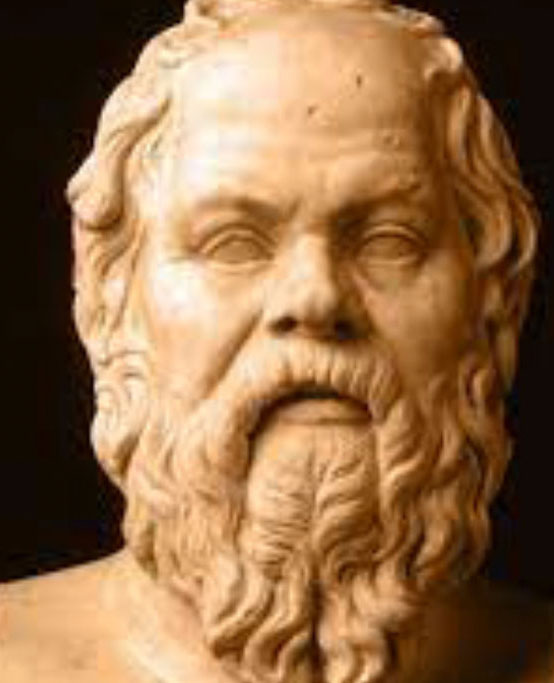KNOW THYSELF
The name NOSTI is short for ‘NOSce Te Ipsum’, the Latin form of the famous Delphic Maxim ‘Know Thyself’ (γνῶθι σεαυτόν or ‘gnōthi seauton’). This is probably the most widespread and enduring advice that mankind has ever received – the notion that the self, or soul, exists as a potential to be realised and that knowledge of the self is the noblest of pursuits and the highest form of wisdom.
It famously featured in the film ‘The Matrix’ when Keanu Reeve’s character Neo visited the Oracle for guidance. ‘Temet Nosce’ (another translation of Know Thyself) was written above her kitchen door – a subtle nod to its earlier appearance in ancient Greece, where it was inscribed over the entrance to the Temple of Apollo at Delphi. Here the High Priestess Pythia served as the Temple’s oracle and gave wise counsel and prophecies to supplicants.

Reconstruction of the Temple of Apollo at Delphi

Socrates (470-399 BCE)

Plato (428-348 BCE)
While its real provenance is unknown, the adage is often attributed to the Seven Sages of Greece – philosophers and wise men living in the 7th to 6th Century BCE – and it was certainly discussed by Socrates and Plato, who respectively asserted that the unexamined life is not worth living and the essence of knowledge is self-knowledge.
However, the saying likely dates back much further to Ancient Egypt where inscriptions such as the one below were found on temple walls and burial sarcophagi:
‘Man, know thyself, and thou shalt know the Gods’.

Anubis attending Sennedjem’s Mummy c.1292-1187 BCE
Sacred Hindu scriptures, including the Vedas and Upanishads, also brought the self into prominence, referring to it as the ‘Atman’ or ‘soul’ and citing its realisation as a means to immortality. The concept is also fundamental to Buddhism, as well as to the two major ancient Chinese faith systems, Confucianism and Taoism – with Confucius recommending a system of government based on self discipline (which implies self-awareness and self-knowledge); and Lao Tzu, the purported founder of Taoism, encouraging disciples of the Tao Te Ching to be aware of themselves rather than the world:

The Tao Te Ching translates roughly as ‘The Way of Integrity’
“Knowing others is intelligence; knowing yourself is true wisdom. Mastering others is strength; mastering yourself is true power.”
(Verse 33 – Tao Te Ching)
From these ancient roots, the idea of the importance of self-knowledge spread across the world, appearing in the Common Era (CE) in early Christian, Gnostic, Islamic and Sufi texts, and later in the writings of mystics and poets such as Rumi, Kabir, Dante and Chaucer. It is also a theme referred to by many literary giants including Shakespeare, Pope, Coleridge, Emerson, Andersen, Whitman, Carroll, Hesse and Huxley.
SO WHO AM I?
According to Deepak Chopra, ‘Who Am I?’ is the only question worth asking and the only one never fully answered. Despite the pervasiveness of the credo, knowing oneself remains one of the most difficult and elusive challenges of all:
“There are three things extremely hard; Steel, a Diamond, and to know oneself.”
Benjamin Franklin

Franklin was one of the Founding Fathers of the US
So how can we come to know ourselves… apart from studying the plethora of literature above? Certainly through self-help initiatives such as journaling, personality testing and auditing. Also, if needed, through psychiatric or psychological support, such as therapy or counselling. Or by engaging in spiritual practices such as mindfulness, meditation or journeying/past life regression.
Alternatively, we might consider creating and studying our own Natal Chart to see if the energetic blueprint we received at birth resonates with who we think we are or helps to explain our values, passions, emotions and behaviours – not to mention the challenges we face in life. Millions of people around the world believe that it does and, whatever you ultimately decide, it’s fascinating stuff to learn about.
-END-
